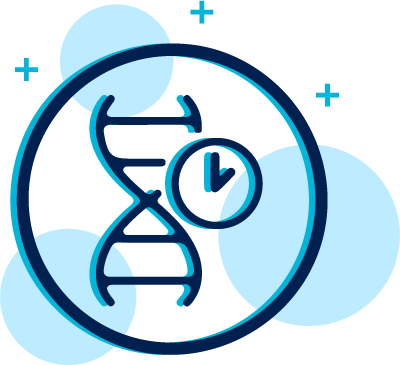
PGT-SR
PGT-SR, also known as structural rearrangement testing, is an advanced genetic screening procedure used alongside in vitro fertilization (IVF). It focuses on identifying structural chromosomal abnormalities within embryos, including translocations, inversions, or deletions. Detecting these issues allows us to select embryos that have a higher chance of implantation and a lower risk of chromosomal disorders.
PGT-SR, preimplantation genetic testing for structural chromosomal rearrangements, is a genetic test performed on embryos created through IVF to screen for chromosomal structural rearrangements normally caused by balanced translocations and inversions. Chromosomal rearrangements can be inherited or may occur spontaneously (de novo). It is estimated that 1 in every 500 people carry a balanced reciprocal translocation. Most are unaware of their balanced translocation carrier status and live normal healthy lives. A person typically becomes aware of their carrier status once they try to have children.
The PGT-SR procedure comprises several key steps:
IVF Process: Eggs are retrieved and fertilized through IVF, resulting in multiple embryos.
Embryo Biopsy: On the fifth or sixth day of development, when embryos reach the blastocyst stage, a few cells are carefully extracted from each embryo.
Genetic Analysis: The extracted cells undergo thorough genetic analysis to detect structural chromosomal rearrangements.
Embryo Selection: Embryos that are found to be structurally normal are chosen for transfer into the uterus.
Transferring Healthy Embryos: Only embryos without structural chromosomal issues are transferred, increasing the likelihood of a successful pregnancy.

Dr. Ashwini G. B.
Dr.Ashwini heads the In Vitro Fertilization(IVF) department at Aspire Fertility Center. She is a member of Indian Society for Assisted Reproduction (ISAR), Federation of Obstetric and Gynaecological Societies of India (FOGSI), Karnataka Chapter of ISAR. Doctor has an experience of 14 years in Reproductive Medicine and her special interests are Polycystic Ovarian Syndrome and Endometriosis.

Dr. SRIVIDHYA G. K.
Dr. Srividhya is an experienced Reproductive Medicine, Maternal Fetal Medicine, Fertility and IVF specialist at Aspire Fertility Center. With her extensive knowledge and experience in reproductive medicine, she is committed to providing the best fertility treatments. Dr. Srividhya specializes in helping individuals and couples overcome infertility challenges and achieve successful outcomes. She is a member of Federation of Obstetric and Gynaecological Societies of India (FOGSI) and Bangalore Society of Obstetrics & Gynaecology (BSOG).
1. Who should consider PGT-SR?
PGT-SR is recommended for individuals or couples with a history of recurrent miscarriages, repeated IVF failures, or known structural chromosomal rearrangements.
2. Is PGT-SR safe for embryos?
Yes, PGT-SR is a safe and established procedure with minimal impact on embryo development.
3. Can PGT-SR guarantee a healthy pregnancy?
While it significantly reduces the risk of structural chromosomal disorders, success depends on various factors, including embryo quality and maternal health.
4. Does PGT-SR require additional IVF cycles?
PGT-SR involves one extra step during the IVF process, which may result in slightly higher costs but can substantially improve the chances of a healthy pregnancy.
5. How does PGT-SR enhance fertility outcomes?
PGT-SR ensures that only embryos without structural chromosomal abnormalities are transferred, reducing the risk of genetic disorders in offspring.
Contact Us
Other Treatments
- Female Infertility
- Male Infertility
- IUI - Intra Uterine Insemination
- IVF - In Vitro Fertilization
- ICSI - Intra Cytoplasmic Sperm Injection
- Fertility Preservation
- Oocyte, Sperm, Embryo Freezing
- Laser Assisted Hatching
- Blastocyst Culture
- PGT- A – Preimplantation Genetic Testing for Aneuploidies
- PGT-M
- PGT-SR
- Consult Online

Add Your Heading Text Here
Lorem ipsum dolor sit amet, consectetur adipiscing elit. Ut elit tellus, luctus nec ullamcorper mattis, pulvinar dapibus leo.
Indian Health & Wellness Awards
Narayana Health won the Silver in Reproductive and Sexual Health Category at India Health & Wellness Summit and Awards.
What is IVF Treatment (In Vitro Fertilization)?
IVF Treatment (In Vitro Fertilization), commonly known as ‘test-tube baby’, is a procedure in which the egg is fertilized by sperm outside the body. The woman’s eggs are removed from the ovaries and fertilized in a fluid medium in the laboratory. Once fertilized, the fertilized egg is cultured for three to five days and then transferred to the woman’s uterus, in order to establish pregnancy. This IVF procedure is undertaken in IVF centers by IVF doctors qualified to administer this process.
Who is IVF Treatment (In Vitro Fertilization) suitable for?
IVF Treatment is advised for women who have problems with their fallopian tubes, due to which normal conception is not possible. The fallopian tubes may be damaged, blocked or in some cases, absent. It is also used in cases of male infertility, due to low sperm count or sperm quality. In such situations, it is used along with Intracytoplasmic Sperm Injection (ICSI).

Add Your Heading Text Here
Lorem ipsum dolor sit amet, consectetur adipiscing elit. Ut elit tellus, luctus nec ullamcorper mattis, pulvinar dapibus leo.
Indian Health & Wellness Awards
Narayana Health won the Silver in Reproductive and Sexual Health Category at India Health & Wellness Summit and Awards.
What is IVF Treatment (In Vitro Fertilization)?
IVF Treatment (In Vitro Fertilization), commonly known as ‘test-tube baby’, is a procedure in which the egg is fertilized by sperm outside the body. The woman’s eggs are removed from the ovaries and fertilized in a fluid medium in the laboratory. Once fertilized, the fertilized egg is cultured for three to five days and then transferred to the woman’s uterus, in order to establish pregnancy. This IVF procedure is undertaken in IVF centers by IVF doctors qualified to administer this process.
Who is IVF Treatment (In Vitro Fertilization) suitable for?
IVF Treatment is advised for women who have problems with their fallopian tubes, due to which normal conception is not possible. The fallopian tubes may be damaged, blocked or in some cases, absent. It is also used in cases of male infertility, due to low sperm count or sperm quality. In such situations, it is used along with Intracytoplasmic Sperm Injection (ICSI).


